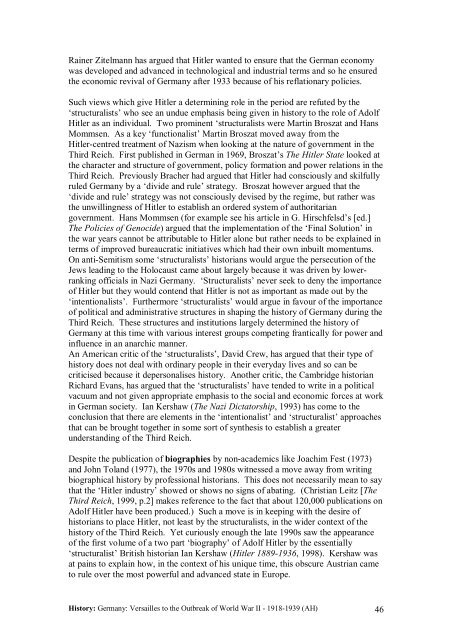PDF file: History - Advanced Higher - Germany - Education Scotland
PDF file: History - Advanced Higher - Germany - Education Scotland
PDF file: History - Advanced Higher - Germany - Education Scotland
You also want an ePaper? Increase the reach of your titles
YUMPU automatically turns print PDFs into web optimized ePapers that Google loves.
Rainer Zitelmann has argued that Hitler wanted to ensure that the German economy<br />
was developed and advanced in technological and industrial terms and so he ensured<br />
the economic revival of <strong>Germany</strong> after 1933 because of his reflationary policies.<br />
Such views which give Hitler a determining role in the period are refuted by the<br />
‘structuralists’ who see an undue emphasis being given in history to the role of Adolf<br />
Hitler as an individual. Two prominent ‘structuralists were Martin Broszat and Hans<br />
Mommsen. As a key ‘functionalist’ Martin Broszat moved away from the<br />
Hitler-centred treatment of Nazism when looking at the nature of government in the<br />
Third Reich. First published in German in 1969, Broszat’s The Hitler State looked at<br />
the character and structure of government, policy formation and power relations in the<br />
Third Reich. Previously Bracher had argued that Hitler had consciously and skilfully<br />
ruled <strong>Germany</strong> by a ‘divide and rule’ strategy. Broszat however argued that the<br />
‘divide and rule’ strategy was not consciously devised by the regime, but rather was<br />
the unwillingness of Hitler to establish an ordered system of authoritarian<br />
government. Hans Mommsen (for example see his article in G. Hirschfelsd’s [ed.]<br />
The Policies of Genocide) argued that the implementation of the ‘Final Solution’ in<br />
the war years cannot be attributable to Hitler alone but rather needs to be explained in<br />
terms of improved bureaucratic initiatives which had their own inbuilt momentums.<br />
On anti-Semitism some ‘structuralists’ historians would argue the persecution of the<br />
Jews leading to the Holocaust came about largely because it was driven by lowerranking<br />
officials in Nazi <strong>Germany</strong>. ‘Structuralists’ never seek to deny the importance<br />
of Hitler but they would contend that Hitler is not as important as made out by the<br />
‘intentionalists’. Furthermore ‘structuralists’ would argue in favour of the importance<br />
of political and administrative structures in shaping the history of <strong>Germany</strong> during the<br />
Third Reich. These structures and institutions largely determined the history of<br />
<strong>Germany</strong> at this time with various interest groups competing frantically for power and<br />
influence in an anarchic manner.<br />
An American critic of the ‘structuralists’, David Crew, has argued that their type of<br />
history does not deal with ordinary people in their everyday lives and so can be<br />
criticised because it depersonalises history. Another critic, the Cambridge historian<br />
Richard Evans, has argued that the ‘structuralists’ have tended to write in a political<br />
vacuum and not given appropriate emphasis to the social and economic forces at work<br />
in German society. Ian Kershaw (The Nazi Dictatorship, 1993) has come to the<br />
conclusion that there are elements in the ‘intentionalist’ and ‘structuralist’ approaches<br />
that can be brought together in some sort of synthesis to establish a greater<br />
understanding of the Third Reich.<br />
Despite the publication of biographies by non-academics like Joachim Fest (1973)<br />
and John Toland (1977), the 1970s and 1980s witnessed a move away from writing<br />
biographical history by professional historians. This does not necessarily mean to say<br />
that the ‘Hitler industry’ showed or shows no signs of abating. (Christian Leitz [The<br />
Third Reich, 1999, p.2] makes reference to the fact that about 120,000 publications on<br />
Adolf Hitler have been produced.) Such a move is in keeping with the desire of<br />
historians to place Hitler, not least by the structuralists, in the wider context of the<br />
history of the Third Reich. Yet curiously enough the late 1990s saw the appearance<br />
of the first volume of a two part ‘biography’ of Adolf Hitler by the essentially<br />
‘structuralist’ British historian Ian Kershaw (Hitler 1889-1936, 1998). Kershaw was<br />
at pains to explain how, in the context of his unique time, this obscure Austrian came<br />
to rule over the most powerful and advanced state in Europe.<br />
<strong>History</strong>: <strong>Germany</strong>: Versailles to the Outbreak of World War II - 1918-1939 (AH) 46
















